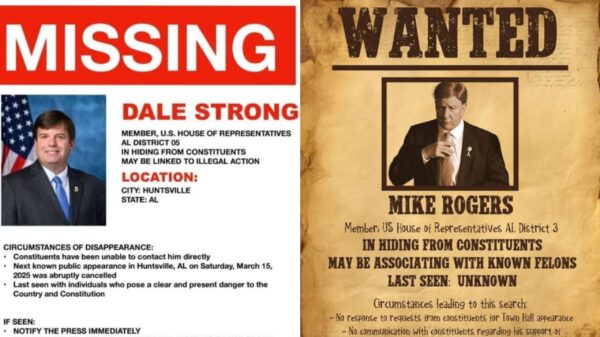By Brandon Moseley
Alabama Political Reporter
Friday, April 3, Congressmen Bradley Byrne (R-Montrose) and Gary Palmer (R-Hoover) both issued separate statements critical of President Obama’s proposed framework for a nuclear deal between Iran, the United States and other world powers.
US Representative Byrne said: “Let’s be clear here: Iran is no friend of the United States. Iran, the world’s foremost state-sponsor of terrorism, has repeatedly demonstrated that their national interests are in direct contrast to our country. Iran’s supreme leader was recently chanting “Death to America” at a rally, and an Iranian general just the other day said that “Israel’s destruction is non-negotiable.” Does that sound like a good negotiating partner?”
Congressman Gary Palmer wrote, “The failure of this Administration to force Iran to definitively abandon its nuclear weapons program leaves Congress as the backstop against this grave threat to the security of the United States, Israel and Europe. As the letter drafted by Sen. Tom Cotton (R- AR) and signed by 47 United States Senators reminded the Iranian government, Congress must have final approval of any agreement, and any agreement that does not stop Iran from achieving nuclear weapons capability is unacceptable.”
Rep. Byrne wrote, “I worry that the United States has become a desperate negotiator as the Obama administration tries to avoid another foreign policy blunder. By lessening sanctions and allowing Iran’s economy to grow with little in return, this deal puts the American people and our allies in the Middle East at risk. Congress must have a role in approving any nuclear deal, and I continue to believe the best approach is to move forward with crippling sanctions until Iran fully stops their nuclear program and ceases operations with known terrorist organizations.”
Rep. Palmer continued, “Iran’s drive to obtain nuclear capability is a serious problem and there is bipartisan concern about this grave threat. Although the deal has limited details, even those limited ones leave cause for concern. The framework, on its face, is far from the original purpose of the talks. Furthermore, I do not believe Iran intends to abide by any agreement it makes. The multi-party talks were intended to discuss dismantling the Iranian nuclear program, but the President has now announced a ‘framework’ of an agreement which allows Iran to keep over 6000 centrifuges and requires them to be only one year away from a nuclear weapon for 10 years. It does not dismantle Iran’s nuclear program and the ambitions of Iran’s radical clerics are not likely to end in 10 years.”
US Representatives Byrne and Palmer are far from alone in their skepticism.
Many Republicans were critical of the proposed plan in which the world would drop economic sanctions against the Iranian regime and allow them to develop nuclear energy capabilities in exchange for promises that they will not enrich uranium to weapons grade. The deal would leave enrichment facilities in place but Iran would allow international monitoring.
Former Arkansas Governor Mike Huckabee (R) wrote on his website, “Each and every day, Iran undermines our allies, threatens our vital interests and murders innocent civilians across the globe. John Kerry lacks the judgment, common sense and moral clarity to negotiate any deal, much less Iran, and I am very concerned with the framework of this deal. We should be tightening our grip with the current sanctions not abdicating to the Ayatollah’s interests.”
CNN is reporting that former Florida Gov. Jeb Bush (R) said that “Nothing in the deal described by the administration this afternoon would justify lifting US and international sanctions, which were the product of many years of bipartisan effort. I cannot stand behind such a flawed agreement.”
US Senator Ted Cruz (R-Texas) said, “The very first step for any deal, good or bad, should be submitting it to Congress, and the President making the case both to Congress and to the American people why this advances the national security interests of the United States.” He told reporters after a town hall in Cedar Rapids, “Now everything President Obama has said up to this date has suggested that he is going to do everything he can to circumvent Congress.”
Sen. Marco Rubio (R-Florida) described the details of the agreement as “very troubling” and said “this attempt to spin diplomatic failure as a success is just the latest example of this administration’s farcical approach to Iran.”
President Obama meanwhile continues to describe the framework as a “good deal.”
In a statement Israeli Prime Minister Benjamin Netanyahu said, “This deal would pose a grave danger to the region and to the world and would threaten the very survival of the state of Israel.”
The Obama Administration has rejected Netanyahu’s demands that any deal include an agreement that Irael has a right to exist. Netanyahu said, “Israel will not accept an agreement which allows a country that vows to annihilate us to develop nuclear weapons.”
Rep. Palmer said, “The President claims this agreement is the only alternative to war. This statement itself is indicative of how the tables have turned in respect to the lack of fear and respect Iran has for this Administration. It should have been Iran who came to the table to negotiate in good faith as an alternative to a strategic and decisive response from the United States and our allies.”
Congressman Bradley Byrne represents Alabama’s First Congressional District; while Gary Palmer represents Alabama’s Sixth Congressional District.
Original reporting by CNN’s Terence Burlij, the AFPs Arthur McMillan, and Fox News contributed to this report.






















































